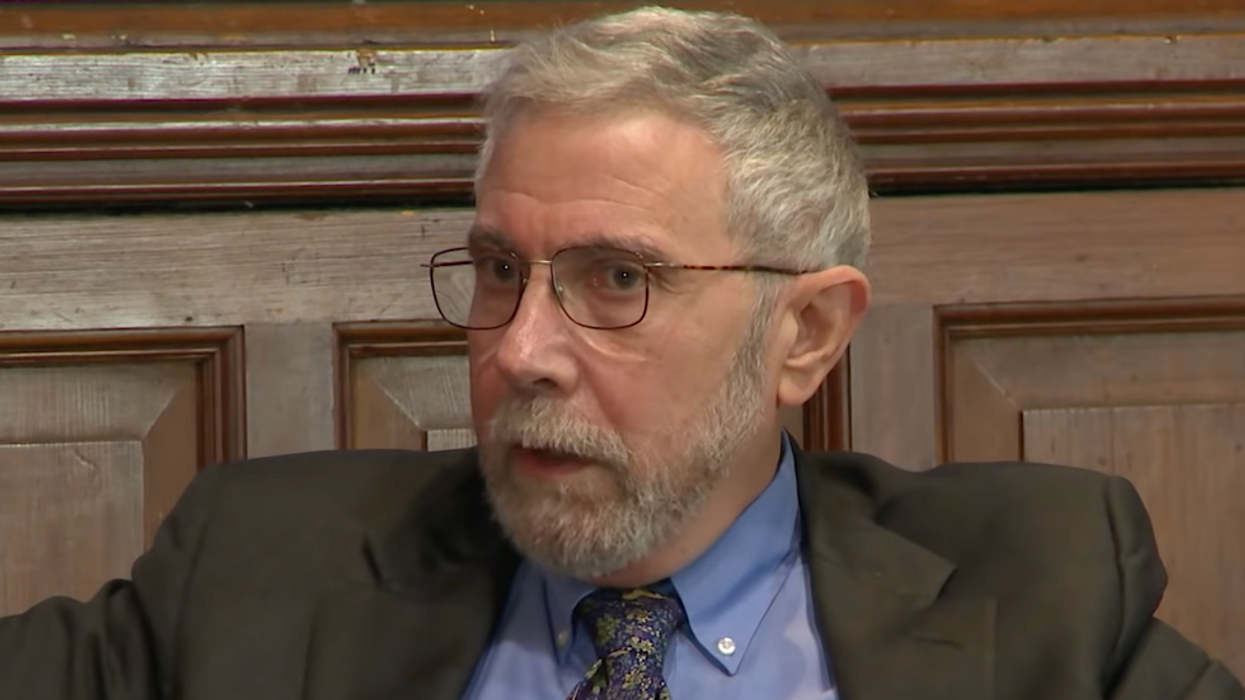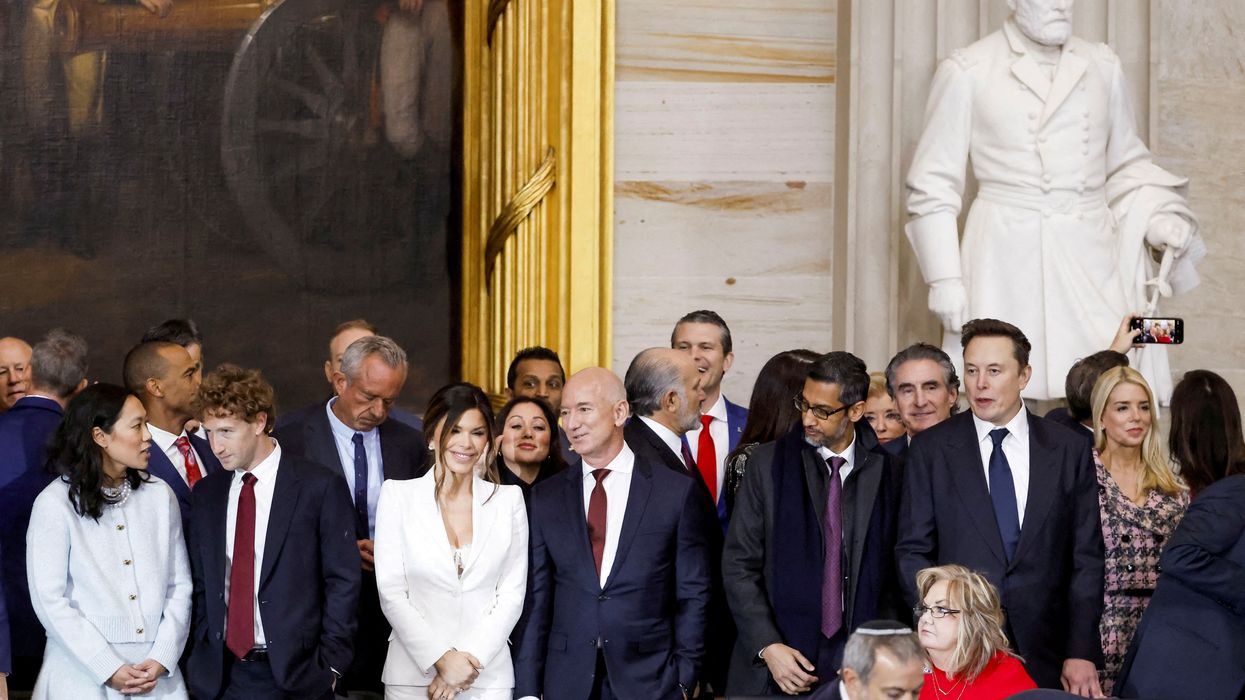
Paul Krugman // The Oxford Union via YouTube
March 05, 2025
Nobel Prize-winning economist Paul Krugman found himself particularly floored by a moment in President Donald Trump's address to Congress on Tuesday in which he made boasts about boosting auto manufacturing even as his tariffs on Canada and Mexico threaten to cripple auto supply chains.
Writing on his Substack page, Krugman explained how car production in the United States will be hampered by the tariffs on America's two biggest trading partners given the way that cars are assembled across all three countries.
"Automobile production, which is deeply integrated across our northern and southern borders — there really isn’t a U.S. auto industry, there’s a North American industry operating in all three countries — will be especially hard hit," he wrote. "I almost choked when Trump declared last night that 'we are going to have growth in the auto industry like nobody has ever seen.' Well, I guess we’ve never seen a large downturn in auto production outside a major recession, which is not to say that we won’t get a recession too."
Taking stock of Trump's economic policies as a whole, including Tesla CEO Elon Musk's slash-and-burn approach to federal workers, Krugman argued that the United States right now is "trapped in a burning Tesla."
"If you don’t know this, the doors on Musk’s cars are designed to open electronically; if they have manual releases at all, they’re difficult to get at and use," he explained. "As a result, there have been multiple instances of people burning alive inside Teslas when the engines catch fire. Well, large parts of the U.S. economy and government appear to be on the verge of self-immolation. And given the combination of arrogance and ignorance shared by Musk and Trump, it’s hard to see how we get out."
Nobel Prize-winning economist Paul Krugman found himself particularly floored by a moment in President Donald Trump's address to Congress on Tuesday in which he made boasts about boosting auto manufacturing even as his tariffs on Canada and Mexico threaten to cripple auto supply chains.
Writing on his Substack page, Krugman explained how car production in the United States will be hampered by the tariffs on America's two biggest trading partners given the way that cars are assembled across all three countries.
"Automobile production, which is deeply integrated across our northern and southern borders — there really isn’t a U.S. auto industry, there’s a North American industry operating in all three countries — will be especially hard hit," he wrote. "I almost choked when Trump declared last night that 'we are going to have growth in the auto industry like nobody has ever seen.' Well, I guess we’ve never seen a large downturn in auto production outside a major recession, which is not to say that we won’t get a recession too."
Taking stock of Trump's economic policies as a whole, including Tesla CEO Elon Musk's slash-and-burn approach to federal workers, Krugman argued that the United States right now is "trapped in a burning Tesla."
"If you don’t know this, the doors on Musk’s cars are designed to open electronically; if they have manual releases at all, they’re difficult to get at and use," he explained. "As a result, there have been multiple instances of people burning alive inside Teslas when the engines catch fire. Well, large parts of the U.S. economy and government appear to be on the verge of self-immolation. And given the combination of arrogance and ignorance shared by Musk and Trump, it’s hard to see how we get out."
'If it's a trade war Trump wants ...': Top economist would target admin's 'Achilles heel'

SHAWN THEW/Pool via REUTERS
(L-R) Priscilla Chan, Meta CEO Mark Zuckerberg, Lauren Sanchez, businessman Jeff Bezos, Sundar Pichai, and businessman Elon Musk, among other dignitaries, attend Donald Trump's inauguration as the next President of the United States.

SHAWN THEW/Pool via REUTERS
(L-R) Priscilla Chan, Meta CEO Mark Zuckerberg, Lauren Sanchez, businessman Jeff Bezos, Sundar Pichai, and businessman Elon Musk, among other dignitaries, attend Donald Trump's inauguration as the next President of the United States.
March 03, 2025
As U.S. President Donald Trump weighed 25% tariffs he plans to impose on Canada and Mexico on Monday, with the White House sending mixed messages in recent days about when the levies will go into effect, a top progressive economist has proposed foreign countries should respond to "the trade war Trump seems determined to stoke" by targeting the "Achilles heel" embedded in the Trump administration.
"Mexico, Canada, and Europe have leverage," wrote Gabriel Zucman, director of the E.U. Tax Observatory, in a column Friday, pointing to the country's "highly internationalized oligarchy: a small group of ultra-wealthy individuals whose fortunes depend on access to global markets."
Commerce Secretary Howard Lutnick indicated Monday morning that Trump has yet to decide whether tariffs on Canadian and Mexican imports—including produce, lumber, vehicles, and electronics—will go forward just after midnight on Tuesday as previously planned; the president has also recently said the tariffs could be delayed until April 2.
But Zucman wrote that whenever the policy does enter force, Canada, Mexico, and any other countries affected "should retaliate by taxing U.S. oligarchs."
Powerful business owners like Tesla CEO Elon Musk—now also spearheading Trump's gutting of federal agencies through the Department of Government Efficiency (DOGE)—Amazon founder Jeff Bezos, and Meta CEO Mark Zuckerberg all rely on markets outside of the U.S. to enrich their companies, which "gives foreign governments influence," Zucman continued.
"If Tesla wants to sell cars in Canada and Mexico, Elon Musk—Tesla's primary shareholder—should be required to pay taxes in those jurisdictions," he wrote. "Of course, this strategy is explicitly extraterritorial, since it applies tax obligations on foreign actors in exchange for access to local markets. But rather than fearing extraterritoriality, countries should embrace it as a tool for enforcing minimum standards, curbing inequality, preventing tax evasion, and promoting sustainability."
Tariffs on oligarchs could fight against Trump's attacks on environmental regulations, push for tax giveaways to billionaires at the cost of crucial public services, and advocacy for re-segregating workplaces, suggested Zucman, while shifting "the economic conflict from a battle between countries—which fuels nationalist tensions and economic retaliation—to one between consumers and oligarchs."
Countries could also "collect taxes that multinationals have dodged elsewhere, gradually eroding the appeal of tax competition" and triggering a "virtuous cycle," added the economist, who focuses on wealth inequality and international tax policy.
With tariffs on oligarchs in place, he said, firms would no longer be incentivized to move to countries that hand out corporate tax breaks because their savings would be offset by the tariffs levied by countries with large markets.
Governments have been accused in taking part in a "race to the bottom" as they try to attract large multinational companies run by some of the richest people in the world, with huge tax breaks that weaken "national safety nets, [kill] jobs by subsidising capital at the expense of labor, [allow] elites to escape the rule of law, and [reduce] productivity and economic growth," as the Tax Justice Network wrote in a 2020 report.
With tariffs for oligarchs, said Zucman "the race to the bottom would soon be replaced by a race to the top."
While the first weeks of Trump's second term in the White House have raised fears over a looming trade war, attacks on immigrants and transgender Americans, mass firings of federal workers, and the United States' withdrawal from international agreements and organizations, Zucman said the Trump presidency "also presents an opportunity."
"This is a moment to rethink international economic relations, calmly but radically," wrote Zucman. "The best response is a new global economic framework that neutralizes tax competition, fights inequality, and protects our planet. Under such a framework, importing countries would enforce tax justice beyond their borders, ensuring that multinational corporations and their billionaire owners pay their fair share."
"If it's a trade war Trump wants," he said, "consumers in Mexico, Canada, Europe, and beyond should unite to ensure that Musk and his fellow oligarchs feel the cost."
As U.S. President Donald Trump weighed 25% tariffs he plans to impose on Canada and Mexico on Monday, with the White House sending mixed messages in recent days about when the levies will go into effect, a top progressive economist has proposed foreign countries should respond to "the trade war Trump seems determined to stoke" by targeting the "Achilles heel" embedded in the Trump administration.
"Mexico, Canada, and Europe have leverage," wrote Gabriel Zucman, director of the E.U. Tax Observatory, in a column Friday, pointing to the country's "highly internationalized oligarchy: a small group of ultra-wealthy individuals whose fortunes depend on access to global markets."
Commerce Secretary Howard Lutnick indicated Monday morning that Trump has yet to decide whether tariffs on Canadian and Mexican imports—including produce, lumber, vehicles, and electronics—will go forward just after midnight on Tuesday as previously planned; the president has also recently said the tariffs could be delayed until April 2.
But Zucman wrote that whenever the policy does enter force, Canada, Mexico, and any other countries affected "should retaliate by taxing U.S. oligarchs."
Powerful business owners like Tesla CEO Elon Musk—now also spearheading Trump's gutting of federal agencies through the Department of Government Efficiency (DOGE)—Amazon founder Jeff Bezos, and Meta CEO Mark Zuckerberg all rely on markets outside of the U.S. to enrich their companies, which "gives foreign governments influence," Zucman continued.
"If Tesla wants to sell cars in Canada and Mexico, Elon Musk—Tesla's primary shareholder—should be required to pay taxes in those jurisdictions," he wrote. "Of course, this strategy is explicitly extraterritorial, since it applies tax obligations on foreign actors in exchange for access to local markets. But rather than fearing extraterritoriality, countries should embrace it as a tool for enforcing minimum standards, curbing inequality, preventing tax evasion, and promoting sustainability."
Tariffs on oligarchs could fight against Trump's attacks on environmental regulations, push for tax giveaways to billionaires at the cost of crucial public services, and advocacy for re-segregating workplaces, suggested Zucman, while shifting "the economic conflict from a battle between countries—which fuels nationalist tensions and economic retaliation—to one between consumers and oligarchs."
Countries could also "collect taxes that multinationals have dodged elsewhere, gradually eroding the appeal of tax competition" and triggering a "virtuous cycle," added the economist, who focuses on wealth inequality and international tax policy.
With tariffs on oligarchs in place, he said, firms would no longer be incentivized to move to countries that hand out corporate tax breaks because their savings would be offset by the tariffs levied by countries with large markets.
Governments have been accused in taking part in a "race to the bottom" as they try to attract large multinational companies run by some of the richest people in the world, with huge tax breaks that weaken "national safety nets, [kill] jobs by subsidising capital at the expense of labor, [allow] elites to escape the rule of law, and [reduce] productivity and economic growth," as the Tax Justice Network wrote in a 2020 report.
With tariffs for oligarchs, said Zucman "the race to the bottom would soon be replaced by a race to the top."
While the first weeks of Trump's second term in the White House have raised fears over a looming trade war, attacks on immigrants and transgender Americans, mass firings of federal workers, and the United States' withdrawal from international agreements and organizations, Zucman said the Trump presidency "also presents an opportunity."
"This is a moment to rethink international economic relations, calmly but radically," wrote Zucman. "The best response is a new global economic framework that neutralizes tax competition, fights inequality, and protects our planet. Under such a framework, importing countries would enforce tax justice beyond their borders, ensuring that multinational corporations and their billionaire owners pay their fair share."
"If it's a trade war Trump wants," he said, "consumers in Mexico, Canada, Europe, and beyond should unite to ensure that Musk and his fellow oligarchs feel the cost."
No comments:
Post a Comment